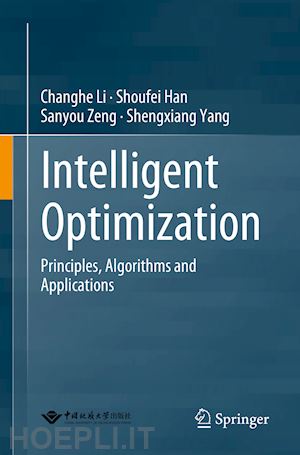

Questo prodotto usufruisce delle SPEDIZIONI GRATIS
selezionando l'opzione Corriere Veloce in fase di ordine.
Pagabile anche con Carta della cultura giovani e del merito, 18App Bonus Cultura e Carta del Docente
This textbook comprehensively explores the foundational principles, algorithms, and applications of intelligent optimization, making it an ideal resource for both undergraduate and postgraduate artificial intelligence courses. It remains equally valuable for active researchers and individuals engaged in self-study. Serving as a significant reference, it delves into advanced topics within the evolutionary computation field, including multi-objective optimization, dynamic optimization, constrained optimization, robust optimization, expensive optimization, and other pivotal scientific studies related to optimization.
Designed to be approachable and inclusive, this textbook equips readers with the essential mathematical background necessary for understanding intelligent optimization. It employs an accessible writing style, complemented by extensive pseudo-code and diagrams that vividly illustrate the mechanisms, principles, and algorithms of optimization. With a focus on practicality, this textbook provides diverse real-world application examples spanning engineering, games, logistics, and other domains, enabling readers to confidently apply intelligent techniques to actual optimization problems.
Recognizing the importance of hands-on experience, the textbook introduces the Open-source Framework for Evolutionary Computation platform (OFEC) as a user-friendly tool. This platform serves as a comprehensive toolkit for implementing, evaluating, visualizing, and benchmarking various optimization algorithms. The book guides readers on maximizing the utility of OFEC for conducting experiments and analyses in the field of evolutionary computation, facilitating a deeper understanding of intelligent optimization through practical application.
chapter 1 Introduction.- chapter 2 Fundamentals.- chapter 3 Canonical Optimization Algorithms.- chapter 4 Basics of Evolutionary Computation Algorithms.- chapter 5 Popular Evolutionary Computation Algorithms.- chapter 6 Parameter Control and Policy Control.- chapter 7 Exploitation versus Exploration.- chapter 8 Multi-modal Optimization.- chapter 9 Multi-objective Optimization.- chapter 10 Constrained Optimization.- chapter 11 Dynamic Optimization.-chapter 12 Robust Optimization.-Chapter 13 Large-scale Global Optimization.-Chapter 14 Expensive Optimization.- Chapter 15 Real-world Applications.
Changhe Li received the B.Sc. and M.Sc. degrees in computer science from the China University of Geosciences, Wuhan, China, in 2005 and 2008, respectively, and the Ph.D. degree in computer science from the University of Leicester, Leicester, U.K., in July 2011. He is currently a professor of School of Artificial Intelligence, Anhui University of Sciences &Technology. He is the Vice Chair of the Task Force on Evolutionary Computation in Dynamic and Uncertain Environments. His research interests are intelligent optimization and machine learning.
Shoufei Han received the B.S. degree in computer science from Hefei University, Hefei, China, in2012, the M.S. degree in computer science from Shenyang Aerospace University, Shenyang, China, in 2018, and the Ph.D. degree in computer science with the Nanjing University of Aeronautics and Astronautics, Nanjing, China, in 2022. He is an Associate Professor with the School of Artificial Intelligence, Anhui University of Sciences &Technology. His current research interests include machine learning, intelligent optimization algorithms, feature selection, data mining and evolutionary computation.
Sanyou Zeng received the M.Sc. degree in mathematics from Hunan University, Changsha, China, in 1995, and the Ph.D. degree in computer science from Wuhan University, Wuhan, China, in 2002. He has been a Professor with the China University of Geosciences, Wuhan, since 2004. His current research interests include evolutionary computation with machine learning for solving problems with constraints, multiobjective, dynamic environments, and expensive costs, especially antenna design problem.
Shengxiang Yang received the Ph.D. degree from Northeastern University, Shenyang, China, in 1999. He is currently a Professor of Computational Intelligence and the Deputy Director of the Institute of Artificial Intelligence, School of Computer Science and Informatics, De Montfort University, Leicester, U.K. He has over 380 publications with an H-index of 65 according to Google Scholar. His current research interests include evolutionary computation, swarm intelligence, artificial neural networks, data mining and data stream mining, and relevant real-world applications. Prof. Yang serves as an Associate Editor/Editorial Board Member for a number of international journals, such as the IEEE Transactions on Evolutionary Computation, IEEE Transactions on Cybernetics, Information Sciences, and CAAI Transactions on Intelligence Technology.











Il sito utilizza cookie ed altri strumenti di tracciamento che raccolgono informazioni dal dispositivo dell’utente. Oltre ai cookie tecnici ed analitici aggregati, strettamente necessari per il funzionamento di questo sito web, previo consenso dell’utente possono essere installati cookie di profilazione e marketing e cookie dei social media. Cliccando su “Accetto tutti i cookie” saranno attivate tutte le categorie di cookie. Per accettare solo deterninate categorie di cookie, cliccare invece su “Impostazioni cookie”. Chiudendo il banner o continuando a navigare saranno installati solo cookie tecnici. Per maggiori dettagli, consultare la Cookie Policy.